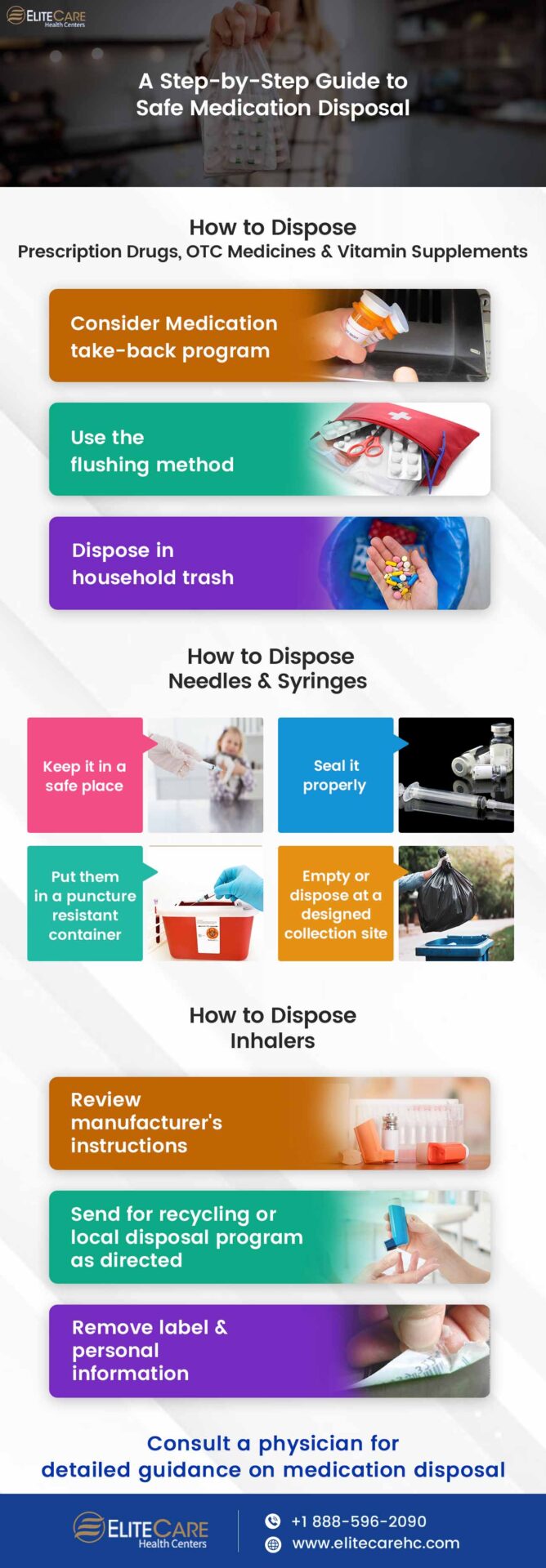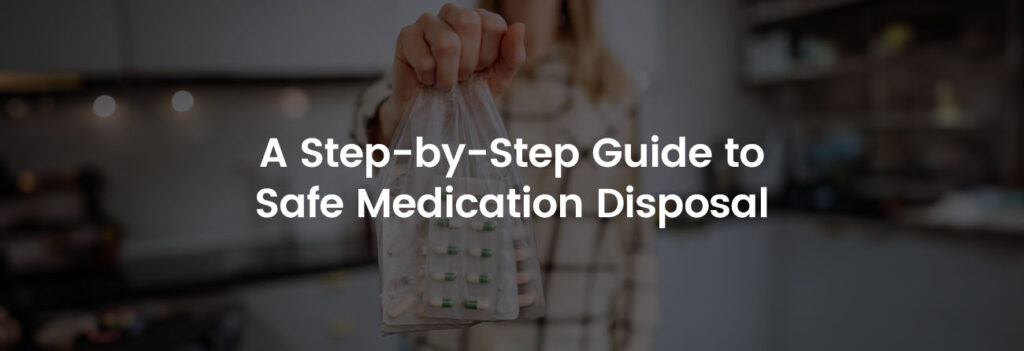
Most of us own a medicine cabinet filled with expired prescriptions, forgotten painkillers, and leftover antibiotics. Individuals usually keep them in storage because of a dilemma: what do we do with them? Flushing them down the toilet or tossing them into the trash regardless of the type of medication is not a safe solution. When improperly disposed, it can pose significant environmental and public health risks.
In this blog post, we will share detailed insights into safe medication disposal, including the potential hazards of improper disposal methods and identifying the types of medications that need special attention. We will also provide the proper techniques recommended by healthcare professionals and environmental experts to safely dispose of medication. Read on to learn more.
Why is Proper Disposal of Unused Medication Important?
Leaving unused medications lying around the house poses a significant risk, especially in households with children or pets. Accidental ingestion of medication can have potentially life-threatening consequences. According to the data, unintentional poisoning is the leading cause of injury death in the U.S., and the majority of these cases are related to accidental exposure to medication.
Moreover, flushing or pouring medications down the drain might seem like a quick solution, but it has severe repercussions. While the FDA approves flushing down certain types of medication, others can seep into water sources and contaminate ecosystems. It not only harms aquatic life but also enters our food chain and can pose significant risks for both humans and animals.
Also, improper disposal of antibiotics can contribute to the growing concern about antibiotic resistance. If these drugs make their way into the environment, they can lead to the proliferation of drug-resistant bacteria. It will make infections harder to treat, posing a serious public health threat.
Types of Medication Disposal
Before you begin the disposal process, identify the type of medication you have. Different types of medication may require specific disposal methods. Therefore, read the label or contact a medical clinic to consult a healthcare provider for detailed information.
1. Prescription drugs, over-the-counter medication, and dietary supplements
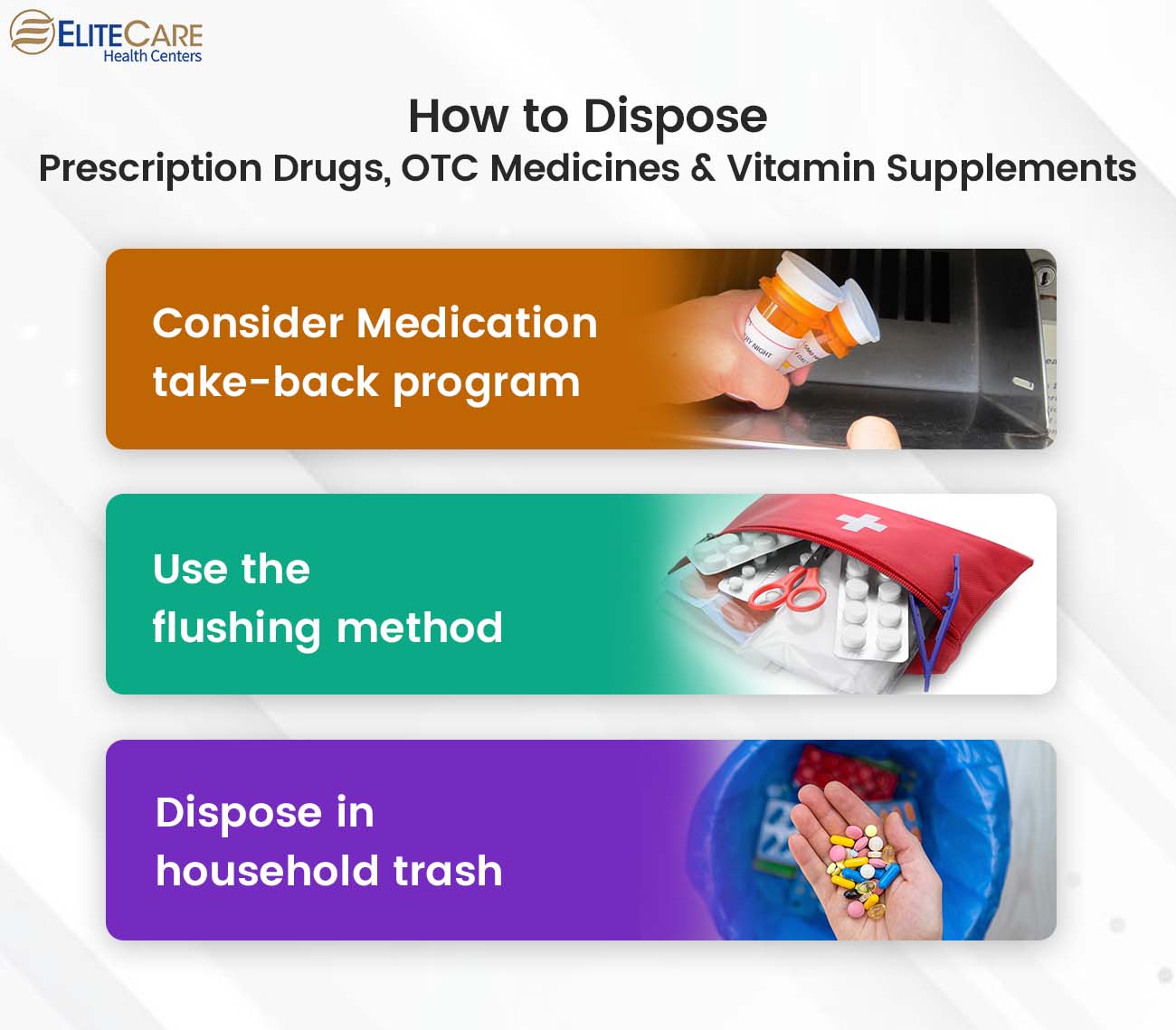
a. Medication take-back program
The safest and most convenient way to dispose of unused medication is through a medication take-back program. The Drug Enforcement Administration (DEA) organizes the National Prescription Drug Take-Back Day in communities across the United States to create awareness about safe medication disposal.
To find a nearby take-back location, individuals can contact local law enforcement officials or visit the DEA website to locate a DEA-authorized collector in their community.
Individuals can also check with their nearby pharmacies since many provide the option to dispose of medication. They may have on-site medicine drop-off boxes, mail-back programs, and other convenient methods to assist individuals in safely disposing the unused or expired medicines.
For personal safety, individuals can consider removing all personal details, such as name and address labels, before dropping drugs off in a take-back program.
b. Flushing
Certain medications can potentially harm others if left unused, and if there is no take-back option readily accessible, the FDA advises flushing methods for those medications.
The FDA provides a list of medications that include,
- Diazepam rectal gel
- Methylphenidate transdermal system patches
- Benzhydrocodone
- Buprenorphine
- Fentanyl
- Hydrocodone
- Hydromorphone
- Meperidine
- Methadone
- Morphine
- Oxycodone
- Oxymorphone
- Sodium oxybate
- Tapentadol
The FDA believes that the potential risks associated with these medications outweigh any potential environmental impact from flushing them away. Individuals should prioritize public safety by following FDA guidelines when disposing of these medications.
c. Disposal in household trash
If there are no drug take-back facilities available nearby, and there are no specific instructions for disposal on the medication label, it is generally safe to dispose most drugs in the trash. Individuals can opt for this method only when the medication is not on the FDA flush list. They can discard most prescription and over-the-counter (OTC) drugs in various forms like pills, liquids, drops, patches, and creams.
There are a few steps individuals need to follow to ensure safe disposal of medication in the trash, which are as follows:
- Take the drugs out of their original containers and mix them with something undesirable, such as used coffee grounds, dirt, or cat litter. It will prevent children, pets, or anyone intentionally seeking drugs from identifying the medicine.
- Do not crush any tablets or capsules.
- Place this mixture in a closable container, such as a re-sealable zipper storage bag or an empty can, to prevent any potential leakage or spills.
- Dispose of the container in the regular garbage.
Those who have questions about how to dispose of their specific medicine correctly should consult their primary care physician or pharmacist for guidance.
2. Needles and syringes
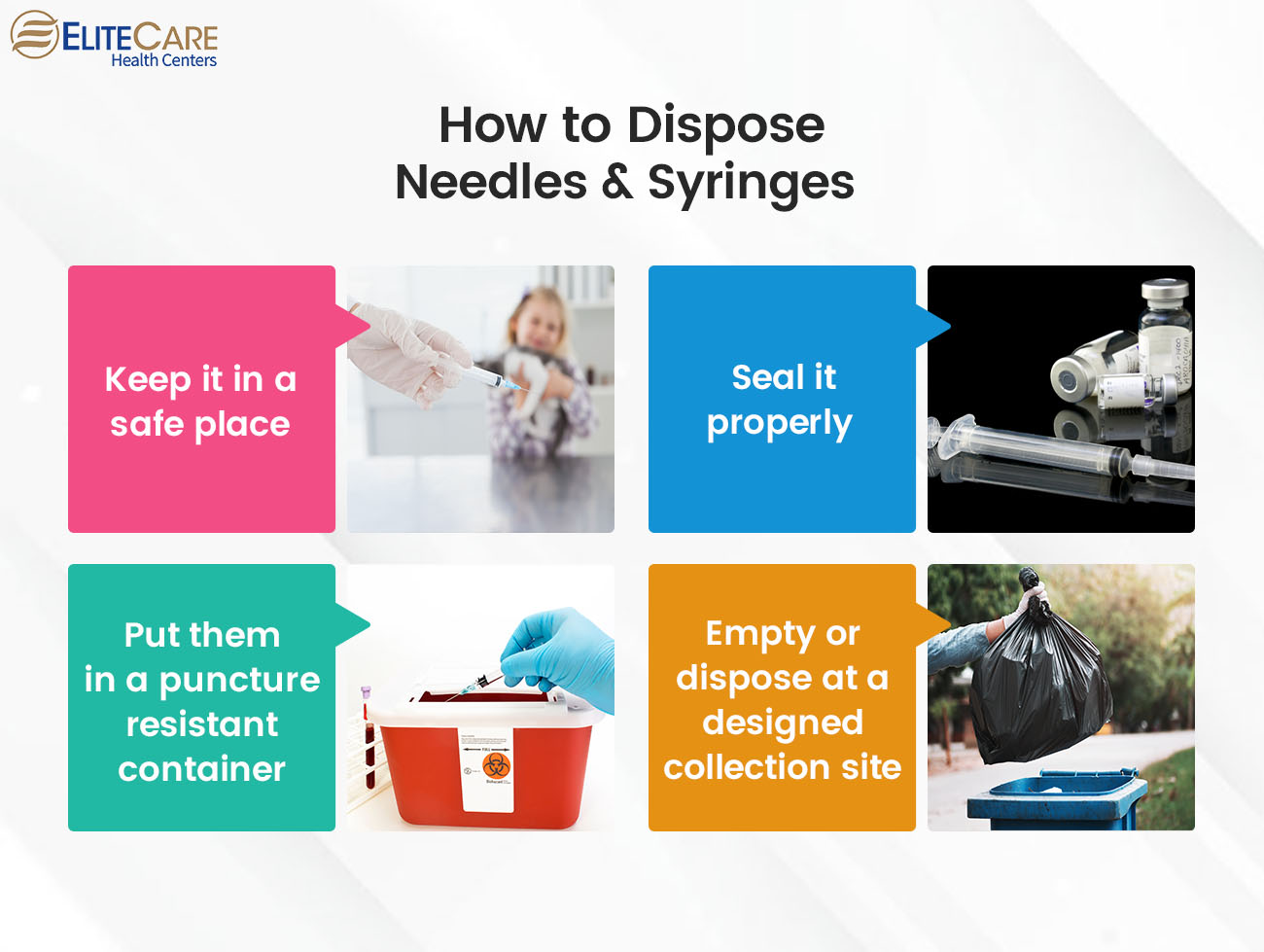
Handling needles and syringes requires extra care and precaution due to the risk of injuries and infection. Follow these steps to ensure safe disposal of needles:
- Place used needles and syringes into a puncture-resistant disposal container immediately after use.
- Ensure the container is kept well out of the reach of children and animals.
- While travelling by air, check the Transportation Security Administration’s website for the latest policies regarding carrying syringes and discarding them.
- If the disposal container is three-quarters full, it is time to empty or dispose it. Seal the container properly before disposing.
Individuals can drop off the container at collection sites, such as medical clinics, hospitals, doctors’ offices, and pharmacies. They can also consider using a mail-back program specifically designed for FDA-approved containers.
3. Inhalers
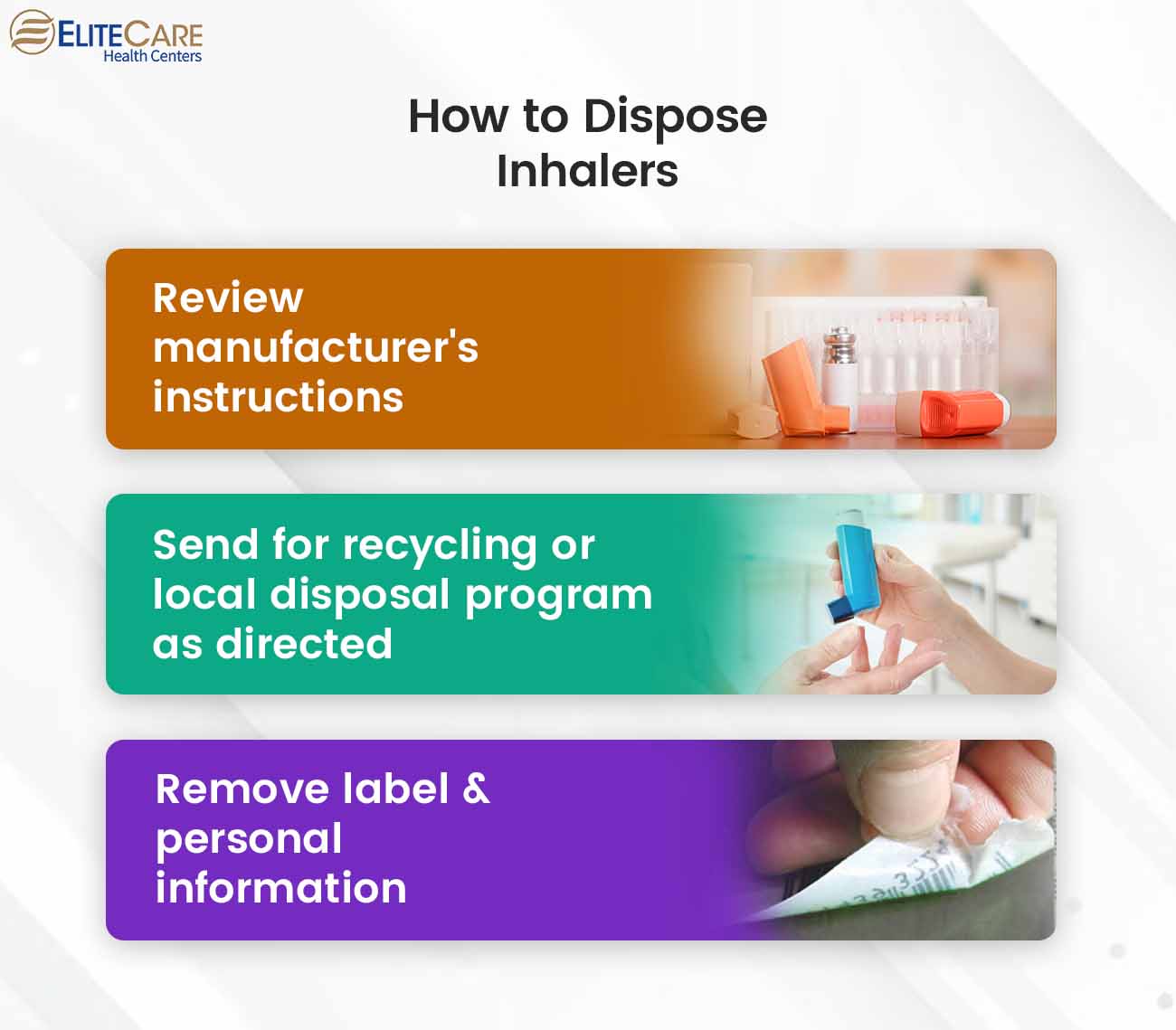
Inhalers should not be thrown in the trash as these products can pose significant health and environmental risk if punctured or disposed of in a fire or incinerator. Carefully read the instructions provided on the labeling of inhalers and aerosol products.
Individuals can also contact the manufacturer or a local pharmacy to inquire about their inhaler recycling or return programs. Some manufacturers provide prepaid mail-back envelopes for inhaler recycling, making the process convenient and eco-friendly.
The Bottom Line
Responsible medication disposal not only safeguards the health of our community but also helps protect the environment. By following the FDA-approved guide, we can actively contribute to a safer community and a healthier planet. It is crucial to remember that individual actions have a collective impact on the well-being of society.
For any queries or concerns about medication disposal, contact EliteCare Health Center, a primary care center in Florida and consult a primary care physician. Experience exceptional primary care and senior care services, including screenings, vaccinations, annual physical exams, dental check-ups, etc. Visit our website to request an appointment with our board-certified primary care physicians now!
